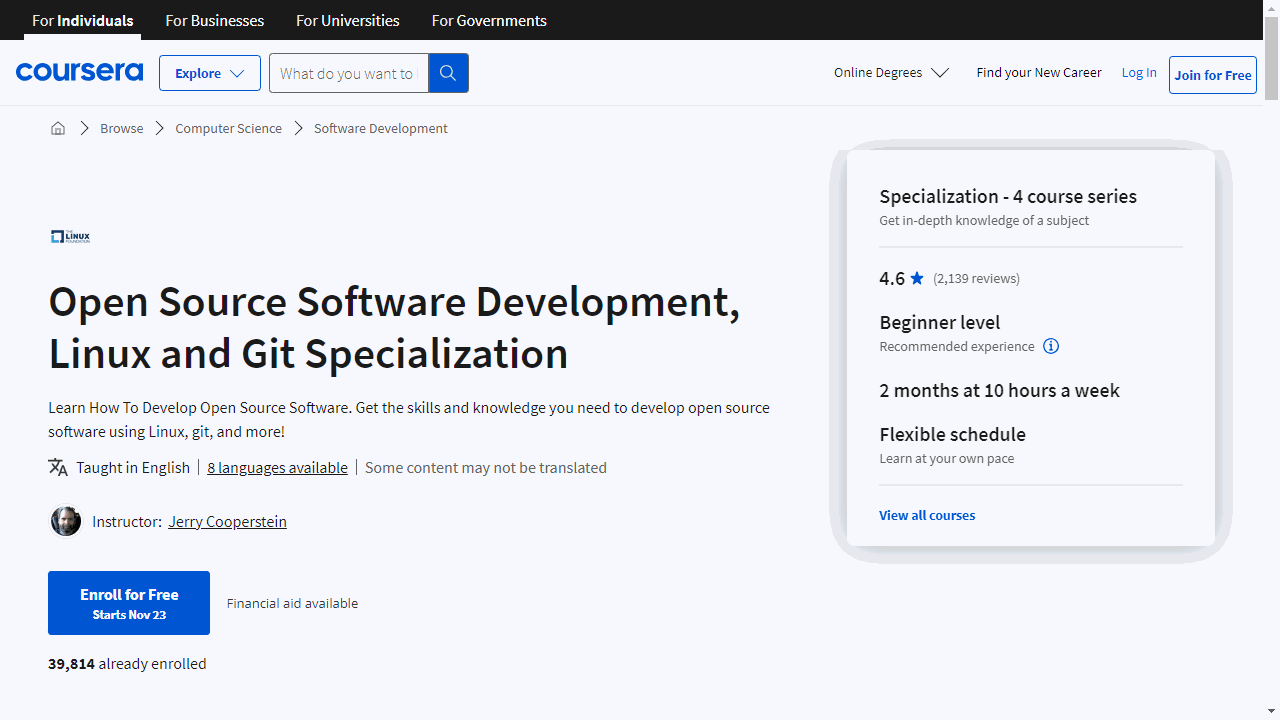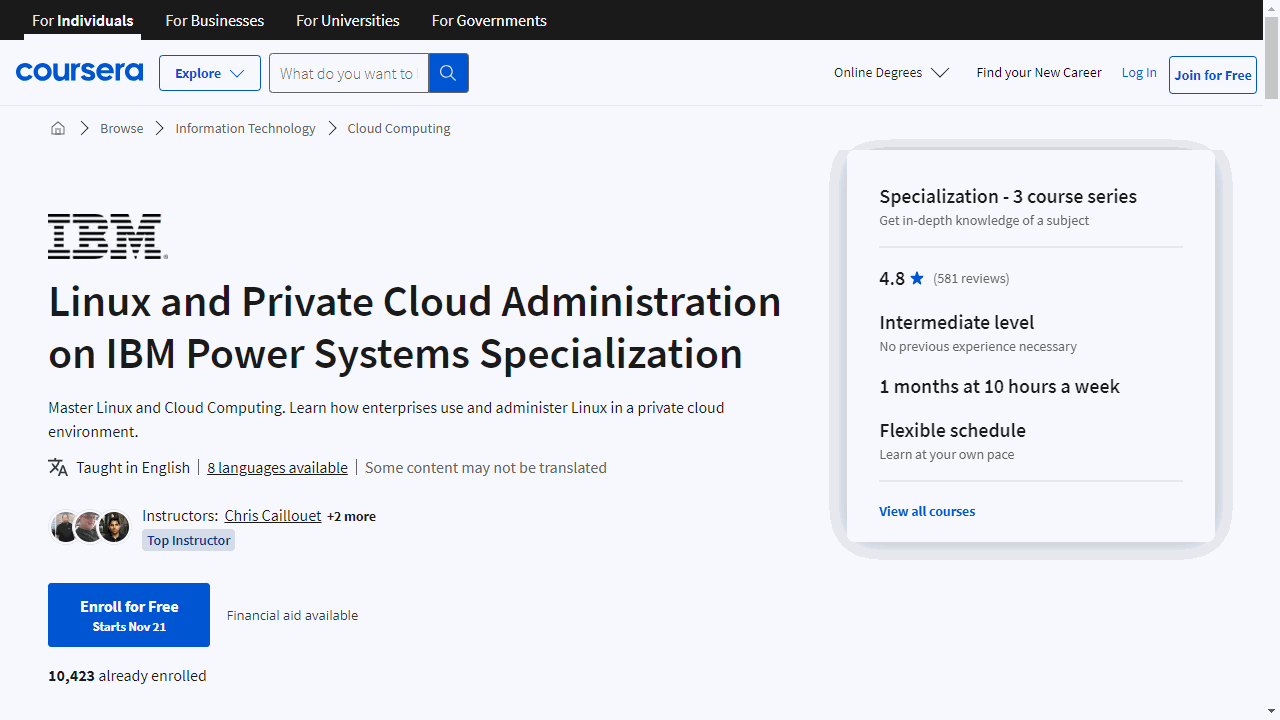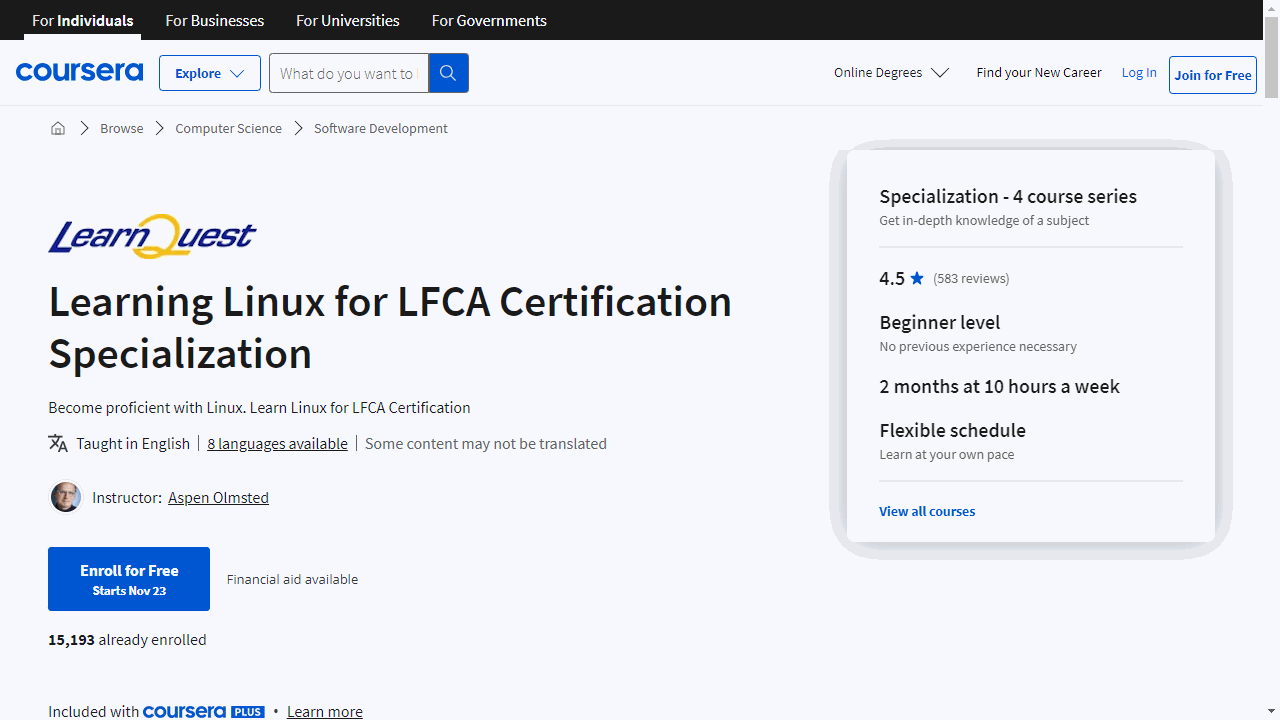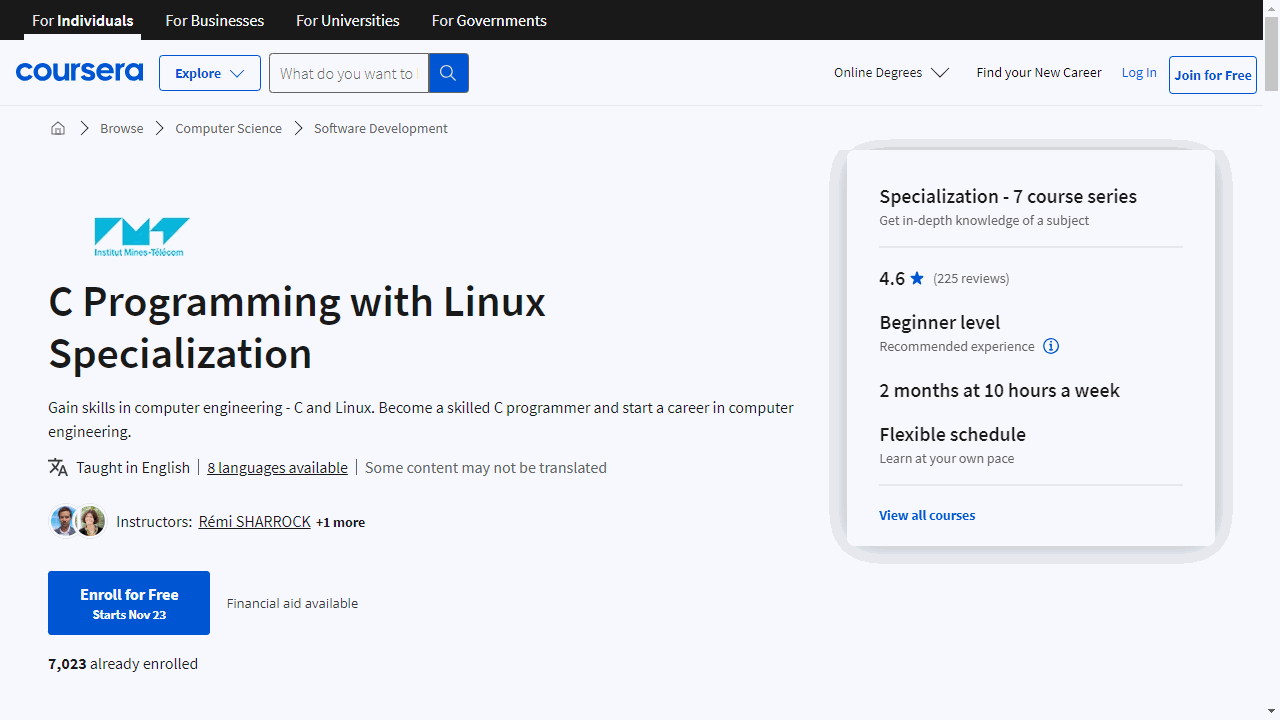Linux is a powerful and versatile operating system that powers everything from servers and cloud infrastructure to embedded systems and even smartphones.
Mastering Linux opens doors to a world of opportunities in various technical fields, including system administration, software development, and cybersecurity.
Finding the right Linux course on Coursera can be challenging, with so many options available.
You want a program that’s comprehensive, engaging, and taught by experts, but also fits your learning style and career aspirations.
For the best Linux course overall on Coursera, we recommend the “Open Source Software Development, Linux and Git Specialization”.
This specialization offers a layered and practical approach to learning Linux, Git, and open source development, equipping you with in-demand skills that can make you a highly sought-after candidate in the tech industry.
The program features hands-on projects, practical exercises, and real-world scenarios, making it an ideal choice for those seeking to build a solid foundation in Linux.
While this is our top pick, there are other great options available on Coursera tailored to different learning levels and specific areas of interest within the Linux ecosystem.
Keep reading to explore our curated list of recommendations, including options for beginners, intermediate learners, and those looking to specialize in specific areas like cloud administration or security.
Open Source Software Development, Linux and Git Specialization
This specialization is structured to provide a layered understanding of open source development, Linux, and Git, delivering practical, in-demand skills that can set you apart in the tech industry.
It begins with “Open Source Software Development Methods,” where you’ll grasp the essence of open source, its historical significance, and the collaborative practices that fuel innovation.
You’ll navigate through licensing models and Continuous Integration, gaining practical insights into using platforms like GitHub for project collaboration.
Progressing to “Linux for Developers,” this course demystifies the Linux operating system, empowering you with command line proficiency and a clear understanding of the kernel’s role.
You’ll learn to differentiate between the system’s graphical interface and its underlying architecture, setting the stage for direct contributions to the kernel and effective system management.
In “Linux Tools for Developers,” the focus shifts to the practical application of command line tools and bash scripting, enabling you to automate complex tasks with ease.
You’ll delve into program compilation, library usage, and the nuances of Java in a Linux context.
The course culminates with the skills to package software, a critical competency for any developer.
The final course, “Using Git for Distributed Development,” equips you with the expertise to navigate Git, the cornerstone of modern version control.
From repository setup to advanced operations like merging and rebasing, you’ll learn to manage code changes, collaborate seamlessly across teams, and troubleshoot with confidence.
With a focus on real-world application, this Coursera offering is a solid choice if you are serious about mastering Linux.
Linux and Private Cloud Administration on IBM Power Systems Specialization
This specialization equips you with the foundational knowledge and practical skills needed to excel in the realms of Linux and cloud computing, with a particular focus on IBM Power Systems.
The journey begins with the “Fundamentals of Red Hat Enterprise Linux” course.
Here, you’ll gain a solid grounding in Linux basics, understanding the system’s organization and mastering introductory system administration tasks.
The course emphasizes the ubiquity of Linux in today’s tech landscape, from powering internet servers to running the operating systems of IoT devices.
By the end, you’ll be adept at using the command line and managing Linux processes, an essential skill set for IT professionals in various fields.
Moving on to “Linux System Administration with IBM Power Systems,” this course delves into the specifics of managing Linux on the powerful IBM Power servers.
You’ll learn about virtualization, including logical partitioning, and the nuances of Linux installation on these systems.
The inclusion of hands-on exercises, utilizing actual IBM data center systems, provides a practical learning experience that bridges the gap between theory and real-world application.
Lastly, “Private Cloud Management on IBM Power Systems” takes you through the intricacies of IBM PowerVC and the broader OpenStack framework.
This course is designed to give you the tools to set up and manage a private cloud environment, offering insights into planning, sizing, and advanced administrative tasks.
It’s a deep dive into the world of Infrastructure as a Service (IaaS), preparing you to efficiently administer cloud-based systems.
The skills you’ll develop are not just in demand; they’re foundational to the current and future landscape of IT infrastructure.
With the practical, hands-on approach of these courses, you’ll be well-equipped to apply your knowledge in a professional setting.
Learning Linux for LFCA Certification Specialization
The LFCA is a certification from the Linux Foundation that stands for Linux Foundation Certified IT Associate.
It is designed for those who are new to the IT industry or want to start a career as an administrator or engineer.
This series of courses is meticulously designed to help you learn Linux and prepare for the LFCA exam.
Begin with “Linux Fundamentals,” where you’ll grasp the essentials of Linux, including its various distributions (e.g., Ubuntu, Fedora, Red Hat etc.) and the command line tools that will become part of your daily toolkit.
This course lays a solid foundation, essential for anyone serious about working in IT.
Move on to “Managing Linux Systems,” which delves into the practical aspects of Linux administration.
Here, you’ll learn system maintenance, user management, and other critical tasks that keep a Linux environment running smoothly.
It’s a practical guide for those aiming to pass the LFCA exam or manage Linux systems with confidence.
Security is paramount, and “Securing Linux Systems” addresses this head-on.
You’ll explore user permissions, authentication, and strategies for data protection.
By the end of this course, you’ll know how to create a robust defense for your Linux systems against potential threats.
Lastly, “Linux Cloud and DevOps” introduces you to the intersection of Linux with cloud computing and DevOps practices.
You’ll get familiar with virtual machines, version control, and the use of hypervisors, preparing you for the demands of modern IT environments.
Each course in this specialization is rich with practical knowledge, setting you up for success in the IT field and on the LFCA exam.
C Programming with Linux Specialization
This specialization is designed to build a strong foundation in both C programming and Linux, two critical skills for modern tech professionals.
The journey begins with “C Programming: Getting Started,” where you’ll hit the ground running, coding directly in your browser.
This course simplifies the learning process, making it accessible even if you’ve never written a line of code.
You’ll learn to create basic programs, handle variables, and use loops to automate tasks.
As you progress to “C Programming: Language Foundations,” you’ll tackle logical statements and arrays, essential tools for data organization and decision-making.
This course also introduces you to algorithms for sorting and searching, skills that are transferable across many programming languages and highly valued in the tech industry.
In “C Programming: Modular Programming and Memory Management,” the focus shifts to functions and pointers, demystifying how memory is accessed and managed in C.
The course’s innovative tools help visualize these complex concepts, ensuring you understand pointers thoroughly, a topic often considered challenging by new programmers.
Building on this knowledge, “C Programming: Pointers and Memory Management” delves deeper into pointer arithmetic and dynamic memory allocation, empowering you to manage memory efficiently and write more sophisticated programs.
The fifth course, “C Programming: Advanced Data Types,” teaches you to define and manipulate your own data types.
This ability allows for more structured and efficient data handling, a skill that can significantly enhance the functionality of your programs.
“Linux Basics: The Command Line Interface” transitions your focus to Linux, the operating system that powers countless devices and servers worldwide.
You’ll become proficient in navigating the Linux file system and using command-line tools, a must-have skill for any serious developer.
Finally, “C Programming: Using Linux Tools and Libraries” rounds out the specialization by introducing you to the professional environment of C programming within Linux.
You’ll learn to utilize libraries, compile multiple source files, and automate building processes with makefiles.
By the end of the specialization, you’ll have a solid grasp of C programming, command-line proficiency, and the ability to work with Linux tools and libraries, setting you up for success in the tech industry.
Also check our posts on:




